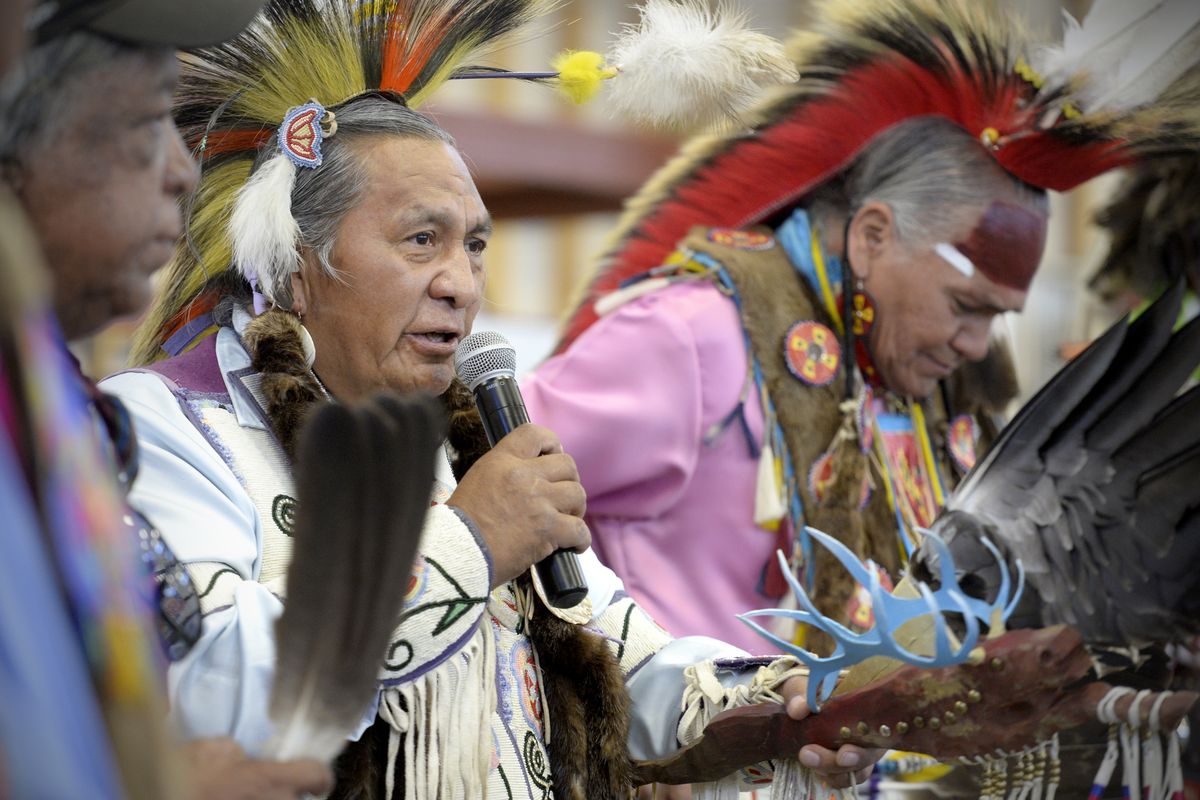Spokane Tribe of Indians holds 100th Labor Day powwow

The 100th Spokane Tribe of Indians Labor Day Celebration and Powwow blended tradition and modernity.
“There’s a melding of the old and the new, which is good,” said Dave Brown Eagle, a Spokane Tribal and Powwow Committee member.
Members of tribes throughout the Northwest came to Wellpinit for four days of dancing, drumming and connecting with one another inside the tribe’s new Wardance Hall, which opened last week.
During Monday’s intertribal dancing, several hundred tribal members were in full regalia – feathers, bright-colored fabrics, beads, bells and buckskin. Everyone joined in the dancing while drummers sang and played.
Carol Evans, vice chairwoman of the Spokane Tribe, welcomed the crowd, remembering the traditions passed down from her family.
“I have very fond memories of my grandmother, parents and all the people that have gone on,” Evans said.
Brown Eagle said he recalls dancing in the powwow as a 6-year-old boy.
It used to be known as the wardance, he said. Before the men went into battle they would dance in a circle while the women surrounded the dancers, offering the men their power by showing support.
Even today, when he dances, he finds his wife, Nora Red Fox, and looks at her.
“I show off for my wife,” he said, explaining that it’s very spiritual, a melding of their powers. “It’s the essence of what the dance is about,” Brown Eagle said.
Tribal elder Lillian Alexie helped find sponsors and donors for the powwow. “They were all really gracious,” she said. Alexie, the mother of author Sherman Alexie, also helped by selling T-shirts and running errands.
She is one of four or five members of the tribe who speak Salish fluently. She learned it from her grandmother and remembers not speaking English when she started school.
“We just converse by ourselves,” she said of the other fluent speakers today. “When we lose an elder, everything about us leaves us. It’s pretty sad.”
A younger member, Patricia Hill, 14, is this year’s Miss Spokane. She said she knows a little Salish, and when she won her crown last week, she spoke some to the judges.
Hill is a ladies’ fancy dancer and represented a butterfly during her dance in the Miss Spokane competition. She’ll wear the crown for a year and can run again next year.
The grand opening of the Wardance Hall included a dedication to Antoine Andrews, a drummer who maintained the traditional Spokane tribal songs during his lifetime. Next year the hall will feature paintings of Andrews and two others, Vi Frizzell, a tribal member who has worked on many of the powwows and is in her 90s now, and artist George Flett, who died earlier this year.
Evans said the tribe hopes to put in a heating and cooling system in the hall so it can be used throughout the year. The tribe also hosts a powwow in January and a traditional stick game on Groundhog Day, and they want to hold health fairs and sporting events there as well.
A century ago, the U.S. government restricted the tribe to one powwow a year, Brown Eagle said. It had to be called a fair, was limited to members 50 or older, and could not include dancing or speaking of Salish, he said.
On Monday, dancers of every age – from the very old to the very young – all freely celebrated their traditions.